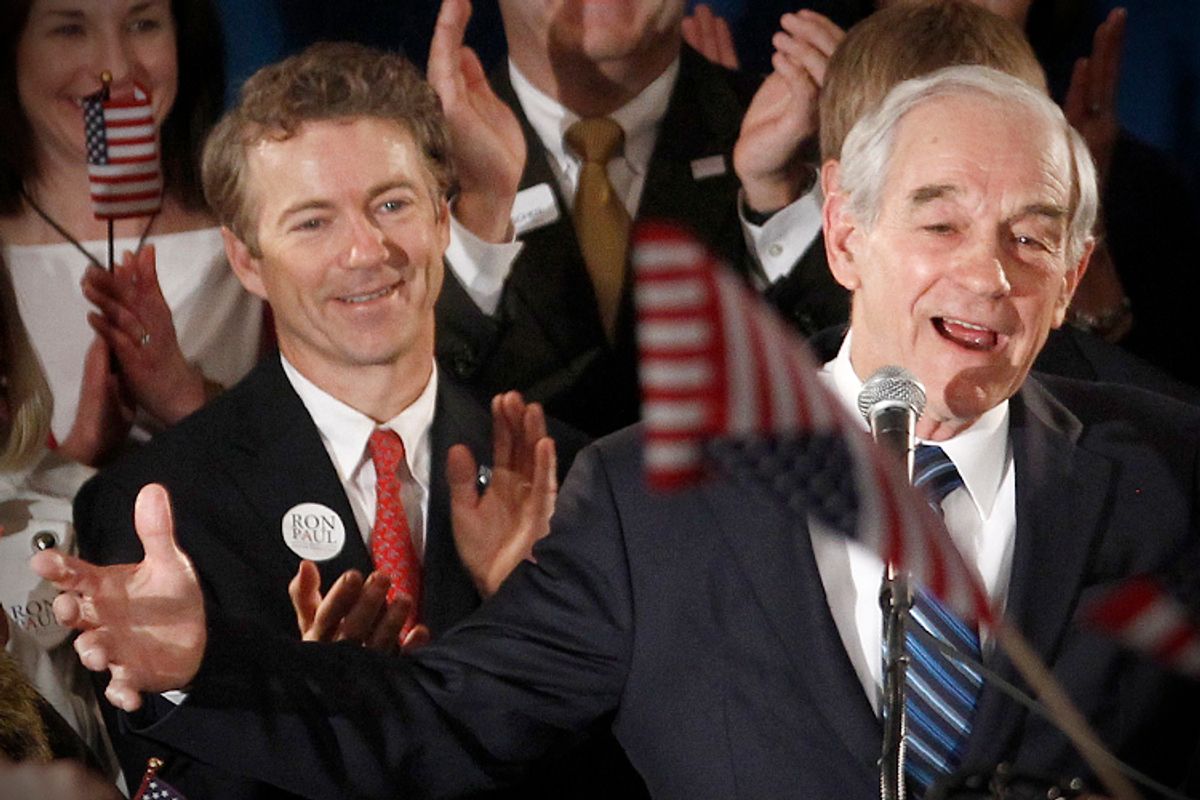Libertarianism has a clever marketing trick. It tries to pitch itself as synonymous with "independent." As in, if you're an "independent" voter who's fed up with both the Republican and Democratic parties, as many are, you're a natural fit for libertarianism, a neutral collection area for those disenchanted with the two-party duopoly. Since a lot of people are fed up with the two-party duopoly, then, it would follow that libertarianism is growing and on the cusp of arriving as a viable national force. Nick Gillespie and Matt Welch, two editors at the libertarian magazine Reason, pitch libertarianism in this vein in their 2012 book "Declaration of Independents." And Welch, along with fellow libertarians Kennedy (the former MTV VJ) and Kmele Foster, host a show on the Fox Business Network called "The Independents."
But being an "independent" or, someone who's looking for something other than the bundled packages that the Republicans and Democrats are selling, does not automatically make one a perfect candidate for libertarianism. That's because libertarianism isn't a void, it's an ideology that's selling its own bundle package. And some of its main components are far from what the disenchanted are looking to buy.
Why are we prattling on about the damn libertarians again? We apologize -- but but but, um, the New York Times Magazine made us! With this week's big story, "Has the 'Libertarian Moment' Finally Arrived?" This appears to be the latest in the NYT Mag's recent series of credulous political cover stories, following the recent hit "Can the G.O.P. Be a Party of Ideas?" (Coming next: "Are Social Conservatives Ascendant?" "Is Bobby Jindal the Next Reagan?" "Will New York City Become a Bastion of Conservatism?")
The argument for the "Libertarian Moment" at long last coming to save us from the scourge of the duopoly is something along the lines of this: Younger people are more socially liberal than previous generations but they also hate the stifling jackboot of the government and want the freedom to #disrupt existing economic paradigms with their apps and their Ubers and so forth. Throw in their suspicion of foreign intervention, and you have a generation perfectly molded for libertarianism:
Emily Ekins, a pollster for the Reason Foundation, says: “Unlike with previous generations, we’re seeing a newer dimension emerge where they agree with Democrats on social issues, and on economic issues lean more to the right. It’s possible that Democrats will have to shift to the right on economic issues. But the Republicans will definitely have to move to the left on social issues. They just don’t have the numbers otherwise.” A G.O.P. more flexible on social issues might also appeal to another traditionally Democratic group with a libertarian tilt: the high-tech communities in Silicon Valley and elsewhere, whose mounting disdain for taxes, regulations and unions has become increasingly dissonant with their voting habits.
Indeed, the left-on-social-issues, right-on-economic-issues libertarian model has made a strong foothold among the entrepreneurs in Silicon Valley. But there's something separating those #innovators from most other people who haven't become libertarians: money. Those libertarians in Silicon Valley already have the big money. And economic security is the blind spot in libertarian ideology that separates it from the great mass of "independents."
Consider Gillespie's metaphor of the garage:
"...Part of why I’m a libertarian is that if you restrict people less, interesting stuff happens.”
Continuing his riff with beatnik locomotion, he added: “It’s like what happens in garages. Rock bands form in garages. Computer companies. And O.K., occasionally serial murders. But as long as you’re not just parking your car there, garages are always interesting.”
(Libertarians are very invested in rock 'n' roll metaphors. The piece opens with Kennedy, the '90s MTV VJ, going on an extended riff about how Ron Paul is the Nirvana of libertarianism, Rand Paul is Pearl Jam, Ted Cruz is the Stone Temple Pilots. Who dare suggest that these people aren't hip to the latest millennial flavors?)
What Gillespie presumes, though, is the existence of a garage. A garage is attached to a home, which is purchased with money from a job and savings. People right now are more worried about procuring the job and the home and the garage than what kewl stuff they'll do with the garage once they get it.
The public is definitely more and more in favor of legalizing weed and same-sex marriage and pursuing a non-interventionist (but not isolationist) foreign policy, but they want still want to have Social Security and Medicare and quality public schools and so forth -- government programs paid for with taxation that libertarians would call "restrictive" or, in more sinister tones, coercive. The 2012 Libertarian Party candidate for president, former New Mexico Gov. Gary Johnson, got less than 1 percent of the vote for a lot of reasons. But one of them was that his "I'm the cool legalized pot and gay marriage and antiwar guy!" shtick didn't paper over his much more radical plan to erode government programs -- by slashing the federal budget by 43 percent in a year. That's not the sort of solution that "independents" are crying out for.



Shares